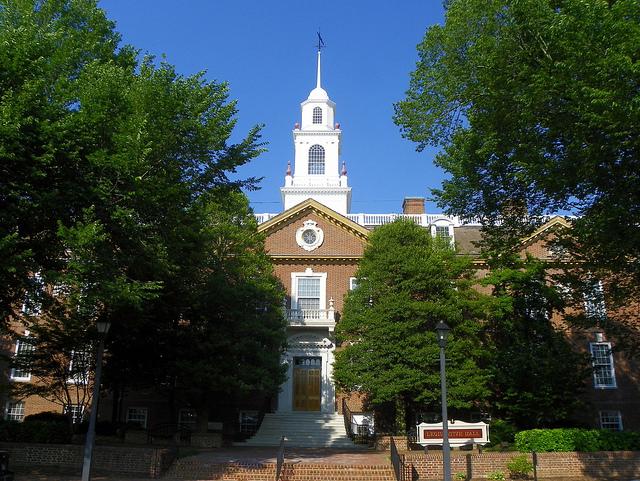
Delaware may only be 45th in population and 49th in size amongst U.S. states, but the First State is poised to become a global leader in sustainability.
One of the catalysts determined to position Delaware as a focal point for business sustainability is Melanie G. Smith. A retiring state legislator from Delaware, she's also the founder and president of Sustainable World Strategies, a consulting firm that helps organizations adopt sustainable strategies to add value to their organization. In recent years, she has focused on creating a framework that in the coming years will be known as the “Delaware Certificate” for transparency and sustainability.
The First State is the perfect place to lead on corporate sustainability. It is no secret that Delaware has long had more companies incorporate there than any other state (in fact, 1.3 million), due in a large part to the corporate law expertise at the state’s Court of Chancery and the fact that corporate case law is far more extensive in Delaware than any other state. Their courts are also well-known for their fast turnaround times, crucial if a company has to close an acquisition deal quickly. Furthermore, companies are also quick to incorporate in Delaware because of the state’s strong privacy protections. The bottom line for a company considering filing papers in Delaware is that by incorporating there, it sends a message to investors it is a national company.
“Delaware is a leader in supporting businesses through our corporate laws, and sustainability is about how they can adopt different strategies to make a difference in the world while improving their bottom line – so taking on this challenge was a no-brainer,” explained Smith.
Hence the light bulb began to blink above Smith’s head, as a few years ago, she began to explore an idea of a Delaware sustainability certification as a tactic that companies could adopt in order to signal to the market their commitment to responsible business.
The outcome was Delaware’s Voluntary Sustainable Certification legislation, signed into law by Delaware Governor John Carney on June 27, 2018. According to Harvard Law School, this act “represents Delaware’s initiative to support sustainability practices by providing Delaware-governed entities a platform for demonstrating their commitment to corporate and social responsibility and sustainability.”
Smith has also taken the lead in launching the Sustainable Delaware Commission. The commission includes the presidents of the state’s higher education institutions; the mayor of its largest city, Wilmington; the president of Delaware’s largest health care system; and the state Governor's key cabinet secretaries, including those that head the departments of transportation and environment; as well as the Secretary of State, its budget office, legislators and business leaders.
The goal is to make Delaware more sustainable by undertaking two strategies.
First, the commission seeks to review all of its operations, from the state’s fleet of vehicles, to its buildings, to Delaware’s 30,000 employees, its procurement dollars and pension investments. In addition, Smith envisions an infrastructure in Delaware that supports (and again, not to regulate) sustainability among Delaware’s various organizations, whether they are part of the the business community, nonprofit sector or local governments.
In the end, Smith sees a Delaware that is environmentally and socially responsible, and most importantly, economically sustainable.
“We could have a rich environment that’s built around sustainability, that could help attract more talent to Delaware. Currently we have researchers and entrepreneurs that come out of our universities that often think about leaving. But if we can convince them to stay we would stand to gain from having a strong economic development tool for our state.”
It’s quite the ambition for a state that for many of us, is only known as the one that became the first to ratify the U.S. Constitution on December 7, 1787. Now, Smith wants Delaware to be known as the First State in the 21st century for other reasons.
“If Delaware can get this right, we could become a laboratory for other states – and even for the world,” Smith said.
A full article about Melanie G. Smith's work will appear in the next edition of CR Magazine, to be released during 3BL Forum: Brands Taking Stands – The Long View October 23-25. Receive a 25% discount using this code PUNDIT2018VIP when you register here.
Image credit: J. Stephen Conn/Flickr

Leon Kaye has written for 3p since 2010 and become executive editor in 2018. His previous work includes writing for the Guardian as well as other online and print publications. In addition, he's worked in sales executive roles within technology and financial research companies, as well as for a public relations firm, for which he consulted with one of the globe’s leading sustainability initiatives. Currently living in Central California, he’s traveled to 70-plus countries and has lived and worked in South Korea, the United Arab Emirates and Uruguay.
Leon’s an alum of Fresno State, the University of Maryland, Baltimore County and the University of Southern California's Marshall Business School. He enjoys traveling abroad as well as exploring California’s Central Coast and the Sierra Nevadas.














